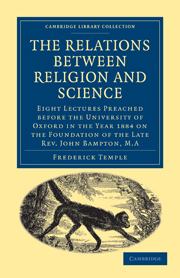 The Relations between Religion and Science
The Relations between Religion and Science Book contents
- Frontmatter
- Contents
- LECTURE I THE ORIGIN AND NATURE OF SCIENTIFIC BELIEF
- LECTURE II THE ORIGIN AND NATURE OF RELIGIOUS BELIEF
- LECTURE III APPARENT CONFLICT BETWEEN SCIENCE AND RELIGION ON FREE-WILL
- LECTURE IV APPARENT CONFLICT BETWEEN RELIGION AND THE DOCTRINE OF EVOLUTION
- LECTURE V REVELATION THE MEANS OF DEVELOPING AND COMPLETING SPIRITUAL KNOWLEDGE
- LECTURE VI APPARENT COLLISION BETWEEN RELIGION AND THE DOCTRINE OF EVOLUTION
- LECTURE VII APPARENT COLLISION OF SCIENCE WITH THE CLAIM TO SUPERNATURAL POWER
- LECTURE VIII THE CONCLUSION OF THE ARGUMENT
LECTURE IV - APPARENT CONFLICT BETWEEN RELIGION AND THE DOCTRINE OF EVOLUTION
Published online by Cambridge University Press: 29 August 2010
- Frontmatter
- Contents
- LECTURE I THE ORIGIN AND NATURE OF SCIENTIFIC BELIEF
- LECTURE II THE ORIGIN AND NATURE OF RELIGIOUS BELIEF
- LECTURE III APPARENT CONFLICT BETWEEN SCIENCE AND RELIGION ON FREE-WILL
- LECTURE IV APPARENT CONFLICT BETWEEN RELIGION AND THE DOCTRINE OF EVOLUTION
- LECTURE V REVELATION THE MEANS OF DEVELOPING AND COMPLETING SPIRITUAL KNOWLEDGE
- LECTURE VI APPARENT COLLISION BETWEEN RELIGION AND THE DOCTRINE OF EVOLUTION
- LECTURE VII APPARENT COLLISION OF SCIENCE WITH THE CLAIM TO SUPERNATURAL POWER
- LECTURE VIII THE CONCLUSION OF THE ARGUMENT
Summary
‘For the invisible things of Him from the creation of the world are clearly seen, being understood by the things that are made, even His eternal power and Godhead.’
Romans i. 20.THE regularity of nature is the first postulate of Science; but it requires the very slightest observation to show us that, along with this regularity, there exists a vast irregularity which Science can only deal with by exclusion from its province. The world as we see it is full of changes; and these changes when patiently and perseveringly examined are found to be subject to invariable or almost invariable laws. But the things themselves which thus change are as multifarious as the changes which they undergo. They vary infinitely in quantity, in qualities, in arrangement throughout space, possibly in arrangement throughout time. Take a single substance such, sav, as gold. How much gold there is in the whole universe, and where it is situated, we not only have no knowledge, but can hardly be said to be on the way to have knowledge. Why its qualities are what they are, and why it alone possesses all these qualities; how long it has existed, and how long it will continue to exist, these questions we are unable to answer. The existence of the many forms of matter, the properties of each form, the distribution of each: all this Science must in the last resort assume.
- Type
- Chapter
- Information
- The Relations between Religion and ScienceEight Lectures Preached before the University of Oxford in the Year 1884 on the Foundation of the Late Rev. John Bampton, M.A., pp. 97 - 124Publisher: Cambridge University PressPrint publication year: 2009First published in: 1884


